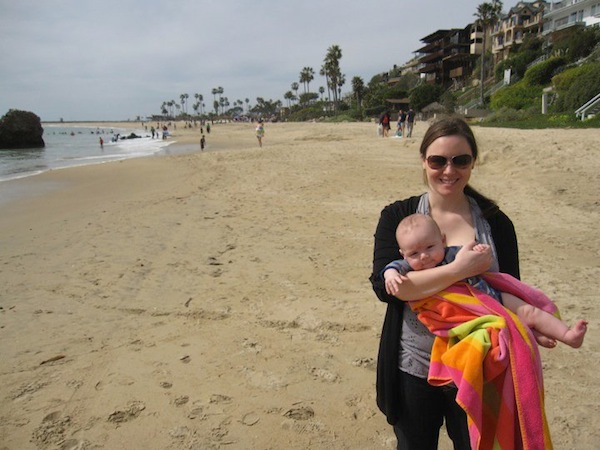Shortly after having my daughter, my new social life revolved around bonding with other new mothers who were navigating the same challenges that I was. Long gone were spacious blocks of time for dinners and trips to the spa. I was looking for other women whom I could commiserate with about nursing, sleep challenges, and adjusting to life with a newborn.
When my daughter was six-weeks old, we ventured out for the first time and met some other new moms at a local cafe. At a time when I felt a deep transformation happening within me, I felt comforted as I connected with others who were also navigating the path of motherhood. Together, we explored the wide-range of motherhood experiences—joyous and difficult.
As a psychologist who specializes in perinatal wellness, I think it is important to discuss the internal and emotional changes that ensue during the first few months of the postpartum period, also referred to as the fourth trimester. Often, health care providers focus on what bodily changes occur during pregnancy, but education stops as soon as the baby is born and mom’s overall wellness fades to the background. During this vulnerable time, it is grounding to learn about the wide-range of emotional changes taking place.
For example, the postpartum period is filled with hormonal shifts/fluctuations, healing from childbirth, sleepless nights, breastfeeding, caring for a newborn, and adjusting to your new identity as a mother. This is an overwhelming burst of change for any new parent to digest.
In my clinical practice, I collaborate with Dr. Thalia Farshchian, a naturopathic doctor who examines a patient’s constellation of symptoms. She identifies the underlying imbalance and provides natural alternatives to restore overall health and wellness. She and I believe that each woman is unique in her experience of being a new mom. With that in mind, we provide a tailor-made treatment plan that meets her individual needs, expectations, and limitations. For example, her use of herbs, nutrients, and lifestyle modifications set a foundation for therapy to be more effective. Simultaneously, when patients feel holistically cared for, they are better able to express the wide-range of feelings that emerge during motherhood.
Together, we compiled the top five ways women can easily incorporate self-care routines into their day-to-day lives with baby.
Ask For Help
Eighty-percent of new moms experience “the baby blues.” This typically happens shortly after childbirth and lasts for approximately seven to ten days. Frequent crying, worrying, and sadness are all a “normal” response as your body adjusts to the hormonal fluctuations of childbirth, and you adjust to the emotional change that has taken place. It’s okay to ask for help. Reach out to family and friends for support. Additionally, your OB or pediatrician can provide a postpartum mood screening if your feelings are concerning to you, your partner, or those around you.
Nourish Your Body
You are what you eat, but you also are what you don’t eat. Moms often get wrapped up in the needs and complacency of their baby and forget to feed themselves. This is particularly true during breastfeeding, as lactation will come to a halt if a mother’s nutrition is not adequate. Easy ways of optimizing nutrition are incorporating a quick morning protein shake, keeping snacks near where you breastfeed and in the diaper bag. By maintaining a diet, balanced in protein, fat, and complex carbs, and eating every 2-3 hours, a new mom can better maintain blood sugar balance for sustained energy.
Don’t Isolate
While having a new baby can be exciting, it can also be lonely. A maternity leave often means time away from work colleagues and friends. In parenthood, as with any major life transition, relationships change. You may be the first of your friends to have started a family, or friends may live across the city in an urban area, all of these factors make it difficult to maintain friendships as they were before. Connecting with local, neighborhood playgroups and “mommy dates” can help break up the isolation as you navigate your new identity during this time.
Let Yourself Off The Hook
So often, new moms become all too familiar with one emotion that leaves them feeling inadequate: guilt. Not being able to do things as before, taking time out for oneself, letting the baby cry, not being the “perfect” parent, are all thoughts that tap into this reservoir of “not enough.” Accepting oneself with the same love and kindness that one accepts their baby helps smooth the guilt-ridden, mommy waters, and it’s wonderful parental modeling for our children too.
Get some Air and Take a Walk
Walking is an incredible way to ease back into your physical activity while enhancing mood and energy levels. The postpartum phase has plenty of new lessons and experiences that can send our stress hormone, cortisol, through the roof. Interestingly, most rigorous exercise also causes transient increases in cortisol as well. When life and exercise become too rigorous, we are set up for burnout. Walking is the only cardiovascular exercise that actually reduces cortisol levels. Not only is the physical activity refreshing, but being outside also gives you a break from your normal routine.
~ Dr. Juli Fraga Psy.D. and Dr. Thalia Farshchian, N.D.
Dr. Juli Fraga is a psychologist in San Francisco. She specializes in reproductive and perinatal health and wellness. She has written for Design Mom, The Conversation on Lifetime, and PsychCentral. Follow her at www.drjulifraga.com or on Twitter @dr_fraga.
Dr. Thalia Farshchian is a Naturopathic doctor. As an expert in women’s health, digestive conditions, hormone conditions, autoimmune disease, weight loss, and environmental medicine, Dr. Thalia’s extensive health toolbox includes herbal medicine, diet and nutritional supplements, lifestyle modification, intravenous therapy, bio-identical hormones and conventional medications when necessary. You can follow Dr. Thalia on her Web site, Facebook, Pinterest, and Twitter (@DrThaliaND) where she regularly posts her medical insights, recipes, and latest findings in healthy living.
This post is solely for informational purposes. It is not intended nor implied to be a substitute for medical advice. Before undertaking any course of treatment or dietary changes, you should seek the advice of your physician or other health care provider.
We aim to provide you with the most honest and credible information possible. This article was reviewed for accuracy by The Honest Team and was written based on sources that are linked at the bottom of the article.
blog_review_statement






